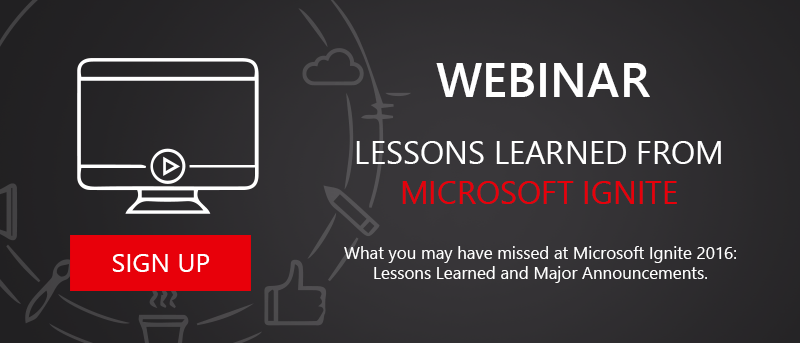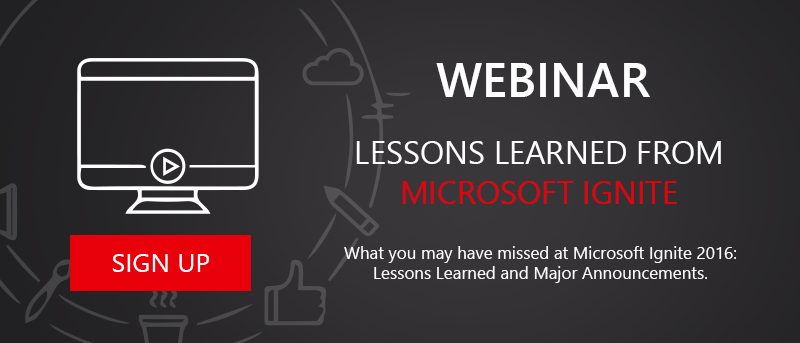Microsoft’s Chris McNulty Shares the Future of InfoPath, PowerApps, and Flow [Video Interview]

We’ve all heard the whispers and speculation, but at Ignite this year it couldn’t be clearer: InfoPath is officially not getting new investment. That means the future of development in SharePoint will be built on PowerApps and Flow. But what are these new programs bringing to the table? And what, if anything, is getting left behind on InfoPath?
Chris McNulty, Senior Product Manager for SharePoint and OneDrive, spared sometime to chat with me between sessions to ease concerns, as well as share a peek at what companies are already building with PowerApps and Flow. If you’re a SharePoint developer, you’ll definitely want to hear what he has to say!
Join us for a Live Q&A on Lessons Learned at Ignite 2016!
More from Dux Quax at Ignite 2016:
- Microsoft’s Julia White Talks Innovation and Transformation
- Microsoft’s Jeff Teper Rounds Up the Top 8 Innovations Added to SharePoint in 2016
- Microsoft’s Bill Baer Talks SharePoint Announcements at Microsoft Ignite
- Microsoft’s Chrisophe Fiessinger Shares the Elevator Pitch for Office 365 Groups
- Microsoft’s Mike McLean Gives the Scoop on Office 365 Planner
- Microsoft’s Rachel Braunstein Gives Insight into the Microsoft Partner Network
- Microsoft’s Jeremy Thake on Why Azure is More than Just Infrastructure as a Service
- NBCUniversal’s Charles Williams on Transforming a Deployment in the New Age of Microsoft
- Microsoft’s Dan Holme Shares Customer Feedback on SharePoint’s Comeback
- Microsoft’s Anna Chu Connects IT Pros Through the Microsoft Tech Community
- Constellation Research’s Alan Lepofsky on How Microsoft AI Will Change the Way We Work
- SharePoint Consultant Susan Hanley on Sustainable Adoption and the Future of Microsoft
Video Transcript: Dux Raymond Sy (@meetdux) and Chris McNulty (@cmcnulty2000)
Dux: Hey everyone, welcome to another episode of Dux Quax, here at Microsoft Ignite 2016. It’s been an epic week. And with me is Chris McNulty. Chris, why don’t you introduce yourself and tell everybody what you’re doing here?
Chris McNulty: Well thanks, Dux. I’m Senior Product Manager for SharePoint and OneDrive. As some of you know, I joined Microsoft about a year ago. I’m a recovering MVP, so please don’t hold that against me.
Dux: There you go. Well, we go way back, man. I mean, the first time I met you was back in your project server days.
Chris McNulty: Absolutely.
Dux: And so, other than SharePoint, you need a project server, Chris is the guy.
Chris McNulty: Yes.
Dux: So Chris, this week, epic, SharePoint, SharePoint, SharePoint.
Chris McNulty: Absolutely, one more time.
Dux: SharePoint.
Chris McNulty: Thank you.
Dux: There you go. So, observations, anything stood out with you this week? I know you talked to a lot of customers and partners in the community. What stands out for you?
Chris McNulty: It’s just how much…you know, I was really proud to see that the stuff that we’ve been working on for the last six months, you know, going back to our future of SharePoint event, we have lots of different pieces we’ve rolled out. And this is the first time we kind of had them all together as a coherent whole as the modern team site. Not just a modern list, not just a modern page, but here’s what the whole experience looks like. And that really watching the crowd reaction this week felt really warmly received.
Dux: That’s great. Now, you speak about experience, right? And I’m sure you get asked this a lot working with large organizations, and a lot of companies have long term investment with SharePoint. I mean, I have a customer I’m working with, they started since WSS2.0 and they’ve been committed, they’ve invested a lot. And I know a lot of the questions that I get, what’s up with InfoPath? So, I know that’s kind of the big elephant in the room, but for once and for all, what’s up with InfoPath?
Chris McNulty: So, InfoPath is officially not getting new investment, as we’ve said.
Dux: Sure.
Chris McNulty: It is supported and sustained for at least 10 more years. Why? Because InfoPath is central to so many business applications, and once it’s there, you’re running it every day, which you’ll love. Moving to something else, we recognize it takes a long time. And we’ve talked about…we want you to get off InfoPath, we never gave you a good answer before. We’ve really learned from that. And now we have the answer, and the answer is PowerApps and Flow.
Dux: I was gonna do a drum roll first, but…PowerApps and Flow.
Chris McNulty: PowerApps and Flow.
Dux: So you heard it here first, officially. PowerApps and Flow will take over InfoPath.
Chris McNulty: They are the successor to the InfoPath SharePoint designer model.
Dux: Awesome.
Chris McNulty: Do PowerApps do everything that InfoPath used to be able to do? No, but PowerApps do so many other things, because out of the box you can connect to four dozen different data sources. You can build flows that are intrinsically supported on IOS, Android and Windows from mobility, as well as browser-based forms. So, we think it just does so many more things. We’re really pumped. We’ve been in preview all year in just looking at what some enterprises have already been able to build. You know, we have dozens of people speaking about PowerApps and Flow this week. Really stoked about it.
Dux: So, talking about PowerApps and Flow and what customers are doing, can you share some examples, especially around SharePoint? Because I know a lot of people, again, love SharePoint and may not have used PowerApps and Flow. Can you provide some high level scenarios on how it could be used?
Chris McNulty: We know that people–there are some companies, so I can’t disclose which ones–that run events around the country every weekend. And during the week they’re back in the office. So they’re taught to SharePoint and they have a browser and so forth. And what they’re able to do, is they’re able to take their data and mobilize it and go to the event, working on their iPhone, working on Android, building PowerApps so they can access their SharePoint data, bring it with them, update it, take pictures, communicate with the entertainers involved with these things, and I’ll just leave it at that.
Dux: And when you talk about that scenario, that sounds like there’s an offline capability as well, right? Because in places they go to, there might not be connectivity, or in a building.
Chris McNulty: We’re still looking at that. So, these are fully connected scenarios today.
Dux: Got it. Today. Awesome, awesome, you know, I mean, I have to ask, you know?
Chris McNulty: You have to ask.
Dux: Sure. Now, Flow, what about Flow ECM, any scenarios around that?
Chris McNulty: Absolutely. So, a lot of the work we’ve been doing this year on PowerApps and Flow is tied to the list, but we are already – and we’ll be rolling it out this afternoon – support for doing things with document libraries. So, if you need to get approvals or routing or, you know, being able to pull attachments out of email and put them into the right repository, all those capabilities are in there. Flow is one of the key things for ECM. ECM is a major investment area for us. It’s been bedrocking SharePoint for 15 years. It’s gonna continue to be at the center. We’re doing some things in ECM like being able to use Office Lens to directly capture images right into your SharePoint processes. So, really psyched about how that’s going.
Dux: That’s exciting. And you mentioned email. People still use email?
Chris McNulty: Yeah. At Microsoft they seem to get, you know, 400 or 500 a day. So, yeah, email is still central, we know.
Dux: There you go. Now, Chris, it’s been an amazing week and we’re pumped to see, after this week, what else is coming. And before I let you go, other than SharePoint related technologies you’ve talked about, if you were a Microsoft product, what would you be and why?
Chris McNulty: Great question. Despite the fact that my voice is at the wrong pitch, I would probably have to say Cortana. Because I love talking to people and I love listening to people, and that’s what Cortana is great at.
Dux: And provide answers, right?
Chris McNulty: Providing answers.
Dux: Now guys, talking about pitch, I’m gonna dig up some old YouTube video, I remember that we did SharePoint Saturday: DC and we had a talent show. I’m gonna find that and maybe point people to it.
Chris McNulty: See, I’ve tried to forget that. I watched that Men in Black 3 where they do the mind erase thing, take the glasses off. I’ve tried to wipe out that memory.
Dux: At least if this doesn’t work out, you have a second career, right?
Chris McNulty: Dux is gonna recreate the memory for all of us, I’m sure.
Dux: There you go. Thanks everybody. Thank you, Chris.
Chris McNulty: Thanks, Dux.
Dux: Enjoy the rest of Ignite. Until the next episode. Bye.
Chris McNulty: Bye.
What else did you miss at Ignite?
Join our panel of experts for our Lessons Learned at Microsoft Ignite webinar to recap announcements from the conference and a deeper discussion about what it all means for you.

With over 20 years of business and technology experience, Dux has driven organizational transformations worldwide with his ability to simplify complex ideas and deliver relevant solutions. He serves as the Chief Brand Officer of AvePoint who has authored the LinkedIn Learning course How to Build Your Personal Brand, the book SharePoint for Project Management, as well as numerous whitepapers and articles. As a public speaker, Dux has delivered engaging, interactive presentations to more than 25,000 people at leading industry events around the world. He also hosts the modern workplace podcast #shifthappens that focuses on how leading organizations navigated their business transformation journey. Dux advocates tirelessly for inclusion, using technology for good, and philanthropic initiatives. Connect with him: http://dux.sy





